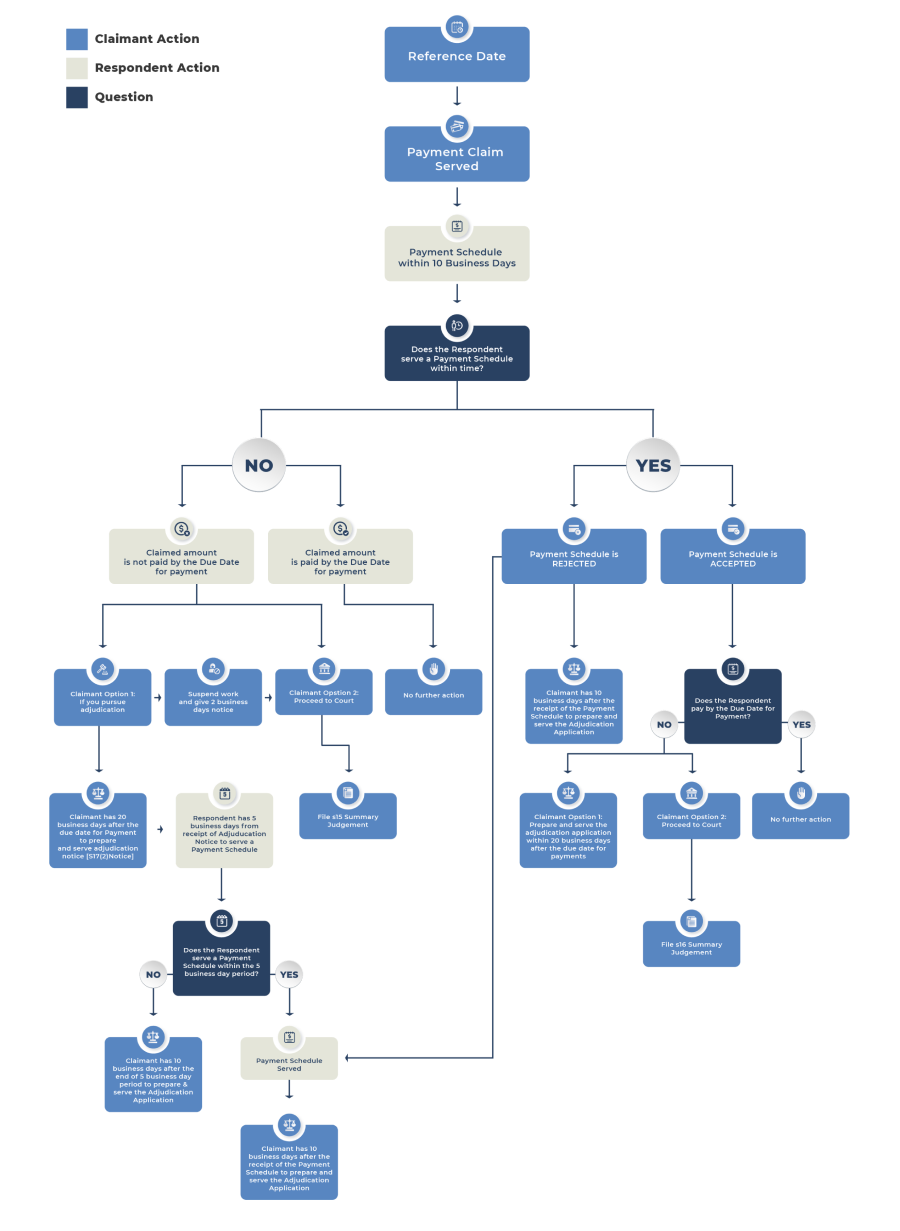What is the Security of Payment Act?
The Building and Construction Industry Security of Payment Act 1999 (NSW) (Act) is the law that gives the claimant the right and entitlement to demand, receive, and recover money from the person who is liable to make payment.
This helps contractors, developers, suppliers, and subcontractors claim progress payment for the works they carried out or goods and services supplied. The Act provides a process the claimant can follow in case they experience late or non-payment.
It is important to note that the Act lays out strict and short time frames that each party must comply with.
Payment Dispute Process and Flowchart
If you find yourself in a dispute, you can deal with it by talking it through with the other party first. But if you cannot resolve the payment dispute, then you can choose to enforce your payment claim and apply for adjudication or commence court proceedings.
Here is a flowchart that could walk you through the entire process when enforcing your rights in NSW.

What is the process of claiming payment under the Act?
Here is the process of claiming payment under the Act. We also included some key documents and concepts you may want to remember when claiming for progress payment for your construction projects.
Payment Claim
The first step in getting payment is to make a payment claim. A payment claim is a document that lists down all the work done. It must include the description of the work carried out or goods and services supplied, including the amount for each of the work.
A payment claim is different from a tax invoice. To have a valid payment claim, it is important that you check your contract for the dates when you can claim for payment. Read here to know more about what a payment claim is and its requirements under the Act.
If you are confused as to what the differences are between invoice and payment claim, read here
Payment Schedule
The payment schedule is the other party’s response to the claimant’s payment claim. It includes the amount of payment due to the claimant and the reasons for withholding (if any). Under the Act, it must be provided to the claimant within ten (10) business days after receipt of payment claim or within the earlier date provided in your contract.
What are the available options in case of non-payment?
There are instances where despite serving a payment claim and receipt of payment schedule, the claimant did not receive payment. What you need to do is to enforce your payment claim. Below are the options available to the claimant in case of late or non-payment.
Adjudication
Adjudication is an alternative payment dispute resolution process. It is one of the options the claimant may choose when:
- There is a payment claim but no payment schedule nor payment received.
- There is a payment claim and a payment schedule but the amount proposed to pay is less than the amount being claimed.
- There is a payment claim and a payment schedule but no payment is received.
Under this process, the claimant will apply for adjudication within the time frame provided under the Act. If the application is accepted, an adjudicator will be appointed. The adjudicator’s role is to determine the amount of payment due (if any) to the claimant.
Court Proceedings
If the claimant chooses not to undergo adjudication or if the dispute remains unresolved despite obtaining a favourable determination, the claimant may choose to commence court proceedings against the person liable to make payment.
Difference between Adjudication and Court Proceedings
Each option has its advantage. Adjudication is more efficient and often more cost-effective than court proceedings. The disadvantage with adjudication is the short timeframe provided under the Act.
However, if the payment claim is found to be lawful, then court proceedings would be less risky than adjudication. The obvious disadvantage of court proceedings is the time and substantial costs associated with litigation.
If you receive a favourable judgment and still have problems getting paid, you can register the judgment as debt and undergo the debt recovery process.
Security of Payment Act Amendments
There are amendments to the Act which took effect in 2019. The amendments will govern construction contracts made on or after 21 October 2019.
One of the most important amendments is the shortened due date for payment. The subcontractors can get paid in 20 business days at a maximum.
For more information regarding what the amendments are, you can read here.
Seek help from our Security of Payment Lawyer
Contracts Specialist has over 10 years of experience in construction law and has specialist lawyers on Security of Payment. They could help you draft your payment claims, payment schedules, and adjudication applications to make sure that your documents are compliant with the Act.
So if you find yourself in a payment dispute, don’t hesitate to call for expert advice on your situation.




